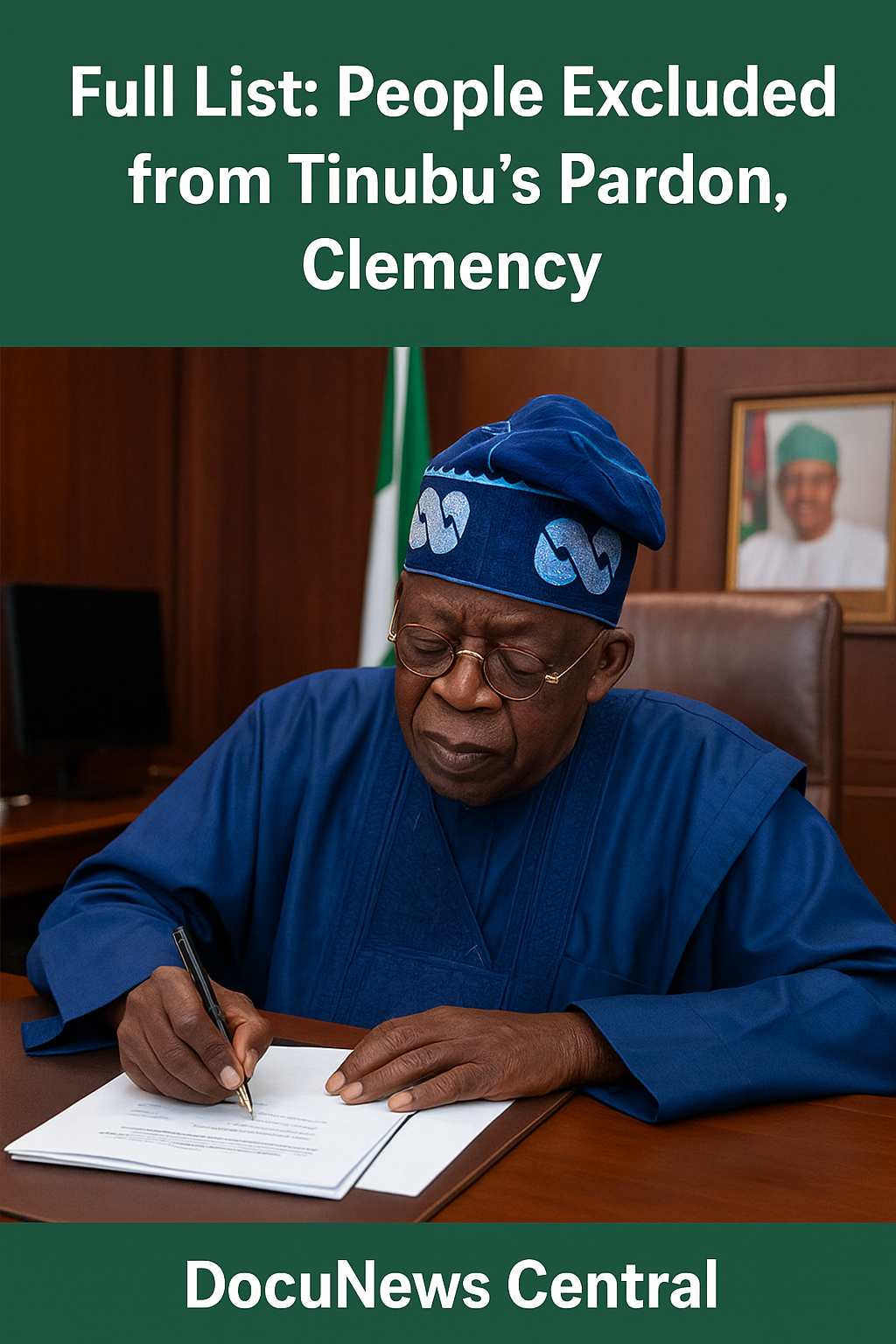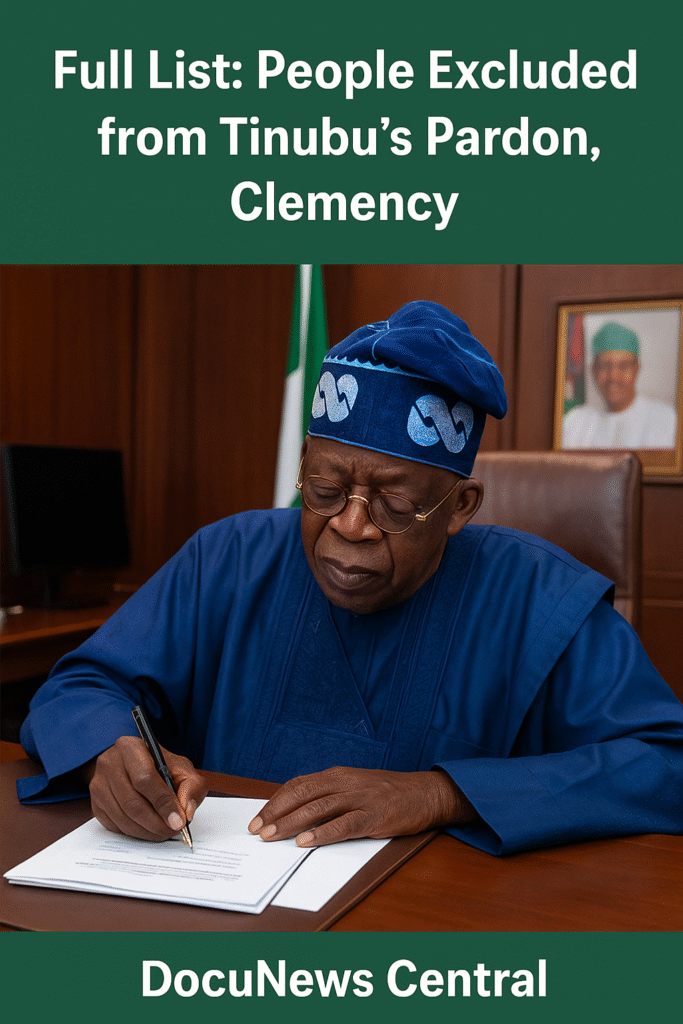

Full List: People Excluded from Tinubu’s Pardon, Clemency
President Bola Tinubu has reviewed his list of persons to be pardoned and granted clemency following outcry.
The Presidency announced that after extensive consultations with the Council of State and the Ministry of Justice, President Tinubu revised the list of beneficiaries of the Presidential Pardon and Clemency Programme to ensure transparency, fairness, and alignment with Nigeria’s anti-corruption goals. The move comes after Nigerians raised questions about the inclusion of politically exposed individuals and convicted public officers.
Background: Why Tinubu Reviewed the Clemency List
Earlier this month, the Federal Government released a provisional list of inmates and public figures eligible for presidential pardon. The list included over 200 individuals, ranging from elderly inmates with terminal illnesses to high-profile politicians convicted of corruption.
However, after massive public criticism and opposition backlash, Tinubu ordered a comprehensive review led by the Presidential Advisory Committee on Prerogative of Mercy. According to a senior government official, the President wanted to avoid what he described as “a repeat of past mistakes where pardons were misused to shield the powerful.”
The Revised Pardon and Clemency Policy
The new directive focuses on three key categories:
- Convicts aged 70 and above with critical health conditions.
- First-time offenders who have served a significant portion of their sentences.
- Inmates recommended for clemency by correctional authorities due to good conduct.
This review automatically disqualified those convicted for economic sabotage, large-scale corruption, terrorism, and violent crimes.
Full List of People Excluded from Tinubu’s Pardon and Clemency
According to information obtained from credible State House sources and published by DocuNews Central, the following individuals were excluded from the updated clemency list:
- Former Governor Joshua Dariye – Despite previously benefiting from a similar pardon under the Buhari administration, the Tinubu-led government has ruled out any further clemency for him, citing public backlash and ongoing asset recovery cases.
- Jolly Nyame – The former Taraba State governor was removed from the list over unresolved allegations tied to misappropriation of public funds and pending appeals before the Supreme Court.
- Abdulrasheed Maina – The ex-chairman of the Pension Reform Task Team, serving an eight-year sentence for money laundering, was excluded after public pressure and recommendations from the Economic and Financial Crimes Commission (EFCC).
- Farouk Lawan – The former lawmaker convicted in the fuel subsidy scandal was initially considered for clemency but was later removed following legal advice that his release would send the wrong signal.
- Diezani Alison-Madueke – The former Petroleum Minister, currently facing trial in the United Kingdom, was not considered for clemency as she is yet to face trial in Nigeria.
- Sambo Dasuki – The former National Security Adviser, though released earlier on bail, was excluded from any pardon list due to ongoing investigations linked to the $2.1 billion arms deal scandal.
- Nnamdi Kanu – Leader of the Indigenous People of Biafra (IPOB) was also excluded despite several appeals from the South-East governors. The government insists that his case remains before the court.
- Omoyele Sowore – The activist and Sahara Reporters founder was not listed for clemency, as his legal matter is considered political and not criminal in the conventional sense.
- Bala Ngilari – The former Adamawa governor’s case was reviewed but struck out on grounds of pending civil litigation and questions over his conduct while in office.
- Raymond Dokpesi – The late media mogul was under review prior to his death, but his name has been officially removed from the pardon records.
Legal and Political Reactions
Legal analysts have applauded Tinubu’s decision to exclude these individuals, calling it a major step toward restoring confidence in Nigeria’s justice system. A senior constitutional lawyer told DocuNews Central Politics Desk that the President’s move signals a shift toward accountability, adding that “pardon is a tool of mercy, not a political instrument.”
Opposition parties, however, argue that the list remains politically motivated, accusing the government of selective justice. The Peoples Democratic Party (PDP) released a statement demanding the full publication of all beneficiaries of Tinubu’s clemency to ensure transparency.
Human Rights Groups React
Several human rights organizations, including Amnesty International and the Civil Society Legislative Advocacy Centre (CISLAC), have urged the government to maintain fairness and prevent any future manipulation of the clemency process. They emphasized that releasing individuals convicted of corruption would undermine Nigeria’s anti-graft reputation globally.
Prisons Reform and Overcrowding Issues
The exclusion list also raises the issue of prison overcrowding. Nigeria’s correctional centers currently house more than 70,000 inmates, with about 70% awaiting trial. Tinubu’s pardon aims to decongest the system while maintaining justice for victims.
Humanitarian advocates have commended the decision to prioritize aged and sick inmates instead of wealthy convicts. “This is the first time a Nigerian President has applied moral discretion in clemency,” said Dr. Uju Ibekwe, a member of the Human Rights Watch Nigeria.
Regional and Political Balance Considerations
According to insiders, Tinubu was also careful to avoid regional bias. The excluded individuals represent different geopolitical zones, showing an attempt at neutrality. Analysts believe this move is part of Tinubu’s broader agenda to build national trust amid increasing political polarization.
Possible Additions in the Next Review
The Presidency has hinted that a second phase of clemency could be announced next year, focusing on inmates with minor offenses and those wrongly convicted. The Federal Ministry of Justice is expected to conduct another round of evaluations before submission to the Council of State.
Public Sentiment and Social Media Reactions
Nigerians on social media have expressed mixed reactions. While many praised Tinubu for upholding integrity, others criticized the opacity surrounding the clemency process. Hashtags like #TinubuPardonList and #ExcludedNames trended for hours on X (formerly Twitter), with users demanding a comprehensive breakdown of all beneficiaries.
What This Means for the Rule of Law in Nigeria
The decision to exclude prominent figures convicted of corruption sends a powerful message: Nigeria’s justice system cannot be compromised for political convenience. It also reinforces Tinubu’s commitment to anti-corruption and institutional reform — an area closely monitored by international partners such as the EFCC and ICPC.
Conclusion
President Bola Tinubu’s revised clemency list represents a defining moment for Nigeria’s justice administration. By excluding politically exposed and controversial figures, his administration is setting a precedent that justice must not be sacrificed for expediency.
As the nation continues to debate the ethics of presidential pardons, Nigerians hope that future clemency exercises will prioritize fairness, transparency, and compassion — values that sustain democracy and the rule of law.
For more related stories, visit our Politics and Governance sections on DocuNews Central.






